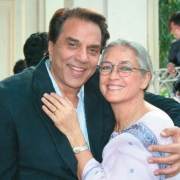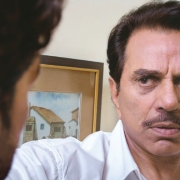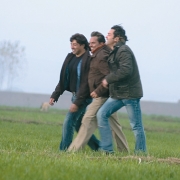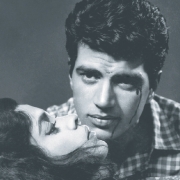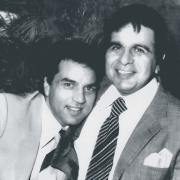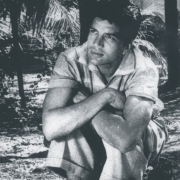
People
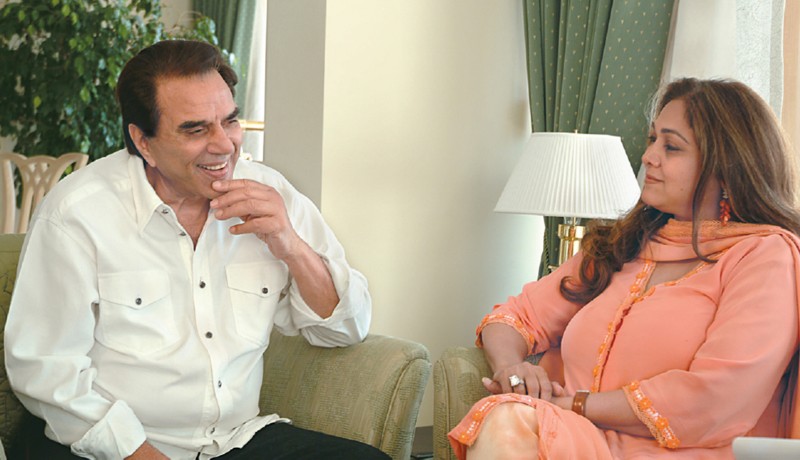
Tina Ambani discovers the softer side of Dharmendra
I first met Dharmendra on the sets of film Rajput in the early 1980s. He was a superstar and looked every inch the part. Like everyone else around me, I was struck by his easy charm, expansive ways and, of course, his dashing good looks. Over 25 years later, Dharmendra, effortlessly handsome, still radiates tremendous presence. And he knows it. Posing for photographs — in a sharp dark suit, and a white shirt with jeans — you observe he hasn’t lost sight of the professional nuances of stardom; he is unfailingly particular about lights, camera angles, the need to strike the right pose. However, there’s a deeper side to him visible now, an earthy wisdom he’s unafraid to voice, the result of deep introspection. His thoughts have found new voice in Urdu verse and with candour he shares his words, his emotions with us. You sense that he is in a good place now, at peace with himself, happy with a career that’s on a roll again; both the past and future his friends. It was a privilege to share that space with him for a few hours on a balmy Mumbai afternoon in October.
Tina Ambani: 2007 has been a great year for you with acclaimed performances in Life in a Metro, Apne and Johnny Gaddar.
Dharmendra: Yes, it’s been a satisfying year. It was hard to be away from the camera. The past 10 years were a little tough and I took a hiatus dictated by circumstances. A new generation of actors came to the fore; our home production Dillagi didn’t do well and we lost a lot of money. But a couple of years ago, we decided to organise ourselves better and work with good people. For example, for Apne, we got Anil Sharma who directed Sunny [Deol; his elder son] in Gadar.
So is this a ‘comeback’?
Yes, I see it as one. But people close to me say, ‘Please don’t say the word comeback; you never went away.’ When I see the reaction of people to my films, I realise Dharmendra is still fresh in their minds and hearts.
Apne must have been very special, acting with both your sons together for the first time…
Yes, it was wonderful. Apne was an emotional film. We are all muscular men but we have soft hearts! Bobby [his younger son] was slightly nervous at first but we managed to overcome that.
Will you work together again?
Yes, we are working on a new film called Masters. It’s a caper about a family of conmen. Sunny’s character lives in London and Bobby’s character is in Australia — for long, they believe their father is dead. Eventually, we reunite in Las Vegas. We are working on the script and hope to start filming next year.
In 2007, you received the Lifetime Achievement Award from the International Indian Film Academy (IIFA) in London. Of all the awards you’ve received, which one is the most special?
The most special was the Filmfare Award for Lifetime Achievement, which I received in 1997 from my idol, Dilip Kumar. He said: “Allah miya ne mujhe aisa kyon nahin banaya?” [Why didn’t God make me so handsome?] Can you imagine how honoured I was?
Could you imagine this success?
I dreamt of it. When I was growing up in Sahnewal [near Ludhiana] in Punjab, I was fascinated by cinema. It was a dream world with beautiful women like Nargis, Madhubala and Meena Kumari and dashing men like Dilip saab. I yearned to be part of it. The Frontier Mail used to cross my village and I used to pray to the train to take me to Bombay.
How long did you wait for your dreams to become reality?
It wasn’t so easy, Tina. I came from a family of farmers; my father was a schoolteacher. When I confided in my mother that I wanted to become an actor, initially she was shocked. When she realised how much it meant to me, she came around. She asked me to send applications to directors in Bombay — she was so naïve she thought you could just apply to become a star! But strangely enough, God was listening to her prayers because that’s how things happened. Filmfare magazine announced a talent search along with United Producers. I went to the barbershop, asked them to style my hair like Dev Anand and sent in my photos.
And you were off to Bombay….
Well, it took another year for the final letter to come, inviting me to Mumbai for a screen test. I was so overwhelmed that I couldn’t breathe properly for a few hours after receiving the letter. When I landed in Bombay in April 1958, a lady from Filmfare came to meet me and told me I looked like James Dean. I didn’t have a clue who James Dean was!
So who did you sign your first film with?
After the screen test, one director said I looked like an athlete not a hero. But Arjun Hingorani had faith in me and signed me for Dil Bhi Tera Hum Bhi Tere — I got just Rs 51 for it! It released in 1960, two years after I arrived in Bombay. In those two years, I kept a low profile. My first film didn’t do that well but I kept working hard and in a few years, I had established myself.
And how! You have made over 230 films.
Yes. Next year, I will complete 50 years in the industry. Of course, at heart I am still 27 years old!
At the IIFA awards, Amitabh Bachchan thanked you for recommending him for the role of Jai in Sholay. It’s great to see such camaraderie.
Yes, Amit is a darling! I didn’t talk about Sholay earlier because Shatru [Shatrughan Sinha] wanted the role and I didn’t want him to be upset. You are right; there was a sense of brotherhood in those days. Today, these youngsters say they are humble but they are acting. They all have an ego, and egotism is contagious. If I hurt someone even unknowingly, I would give them a hug.
What do you feel has been your finest performance?
Recently I read a review of Apne written by someone in America. That reviewer wrote: “Dharmendra is not a method actor; he just plays each role with sincerity. Whenever he gets a good script, he looks different. He is able to transform himself into that character.” He’s right. Take my roles in Chupke Chupke and Sholay. You can’t say it is the same man. And I add nuances to the script wherever required. For example, take the scene in Sholay where Veeru stands on the water tower and calls out to Maasi. I fumbled with the words like a drunken man would. The scene was a hit.
Another memorable role I played was that of the doctor in Bimal Da’s [Bimal Roy] Bandini, opposite Nutan. It was a restrained performance — I spoke so little but there was such resonance. Filmmakers like Bimal Roy and Hrishikesh Mukherjee, with whom I did Anupama, Satyakam and Chupke Chupke, gave me very true-to-life characters to play.
Do you prefer Dharam, the lover, over the action hero?
Love is also action, Tina! I am driven by love. Love should never be demanding; it must be unconditional. Love is an exquisite pain and in that pain lies intoxication. And if your lover shares that pain, the intoxication reaches another level altogether. I have been privileged enough to share such a love for over 25 years and it is amazing.
Who are your favourite actors?
There’s no one better than Dilip Kumar. Among the ladies, Madhubala, Meena Kumari and Nargisji. Among today’s heroines, I like Rani and Preity. Aamir and Shah Rukh are good; I liked Abhishek in Guru. Actually, these boys are all like my sons. How can a parent say which child is more beautiful?
How do you get along with your own children?
Wonderfully. My girls, Esha and Ahana, are more open with me, though. I guess daughters have that kind of bond with their fathers. Sunny and Bobby are a little shy. Sunny is also a bit of an introvert.
You are also a grandfather. What is that experience like?
It’s wonderful to be with grandchildren; they talk so sweetly. It also makes you realise how old you’ve become. You begin to realise what our parents wanted from us — now it’s too late, they are not with us any more. We gave our parents money when all they wanted was our time and attention. Otherwise, life is empty. If Sunny and Bobby don’t share their lives with me, I will be reduced to a shell. In fact, I wrote a few lines about this:
Ungli pakad kar chalna sikhaya jinko
Kadam unse chalna mohal ho gaya
Shikayat yahi rahi hogi ma baap ki mere bhi mujhse
Kaash is ahsaas ne us wakt jagaya hota
Aaj jis dard se main guzar rahan hoon
Ma baap ka wo dard mitaya hota
(Those whom I taught to walk
I can’t match their steps today
Even my parents would have harboured similar regrets
Pity, I didn’t realise it then
The pain that I feel today
Wish I hadn’t given that pain to my parents)
That’s beautiful. Have you been writing a lot?
Yes, I’ve been writing a lot of verse about matters of the heart.
When did you start writing?
A few years ago I had to remain alone in America for a couple of months for medical treatment. I felt very lost. Then I heard a voice — it was my tanhayee (loneliness). In my mind’s eye, she had a godly face. “Remember,” she said, “when you first heard the lullaby of your dreams, you were cradled in my lap. Whenever you experienced a setback, I was by your side. Then, when you became immersed in your life as a star, you never thought of me. Today, you are alone and I’ve come again. Speak your pain out loud; I will listen. Use your pen to excise your pain.” That’s when I started writing. Instead of seeing loneliness as a witch who will consume me, I made her my mother who brought poetry to my life. Most of us share our secrets, our fears with loneliness ¬— we just don’t realise it.
Do you plan to get your verse published?
Not as a book, although I may translate it into film, with my letterhead as a backdrop and a camera capturing me as I write:
Nahi nahi mein shayar nahi
Shayari mujhe aati nahin
Tasrat hai dil ke meri
Meri kalam ne likh diye
(I am not a poet
It’s not in me to write poetry
It’s my sadness, that
My pen wrote about)
Like Vyjyantimala and Dev Anand, are you planning to write your memoirs?
Instead of writing, I may make a film of my life, covering the highs and lows; my directors, writers and heroines.
You are also a Lok Sabha MP, representing Bikaner…
Yes, I have a year left. I have cleaned up the Sursagar area; it was a sore on the face of Bikaner city. Another initiative was to have a venue for the arts; that should be complete by next year. In our country, an MP has the power to accomplish a lot. The problem is that most MPs look at their work as power, not service. Bureaucrats also make it very hard to get things done.
You reportedly once said you should be elected dictator….
Yes. Make me dictator for five years and I’ll show you what I can do. I’ll clean the dirt out. We need to bring law and order and should bring about the necessary changes in the constitution to achieve this. And we should stop vote bank politics done in the name of communal harmony. People have stopped loving their country. Everybody has forgotten the ‘mother’ in motherland.
Will you stand for re-election?
I don’t think so. I was emotionally blackmailed the first time!
I read that you are developing a hi-tech film city in Jaipur.
We didn’t get the land so the project is on hold.
The media has always had a lot to say about your life. How do you handle controversy?
I have always lived my life like an open book. I’ve never forced myself on the media. I thought I should have got an award for many films. But if I didn’t get the award, I would quietly have a drink and go home. The media talks about King Khan or Big B. But whenever these stars talk about me, it is with love and respect. You know, Dev saab once said to me, “Dharam, you are the best father, the best husband, the best lover. How do you do it?” It’s because I live for everyone around me. If they are happy, I’m happy. So whether or not I get love from the media, I get it from my family — the film industry.
And all the female actors still rave about your good looks. How do you stay so handsome?
Whatever is in your heart and soul shows in your face. For the past few years, I have been practising pranayama [yogic breathing exercises] every day. It has transformed my life. I find it intoxicating — it has the same effect on me that alcohol used to. I used to drink a lot but I stopped about five years ago.
Do you smoke?
No, I stopped in 1983. I threw my cigarettes away at the release of Betaab [a film starring Sunny Deol]. I used to smoke two packs a day. But I felt I was losing my stamina and I constantly had a bad throat so I gave it up.
Tell us about a typical day in your life.
I start my day at 5 or 5:30 am. First, I exercise for about an hour. I do exercises without weights and work out on the cycle and treadmill. Then, I do my pranayama. Also, no matter where I am, I pray for 45 minutes everyday. I’ve done this since I was 13.
What do you pray for?
My prayer has changed over the years to reflect my hopes and dreams. Har insaan ki mazhab mohabbat ho jaye. (I pray that everyone’s religion becomes love.) I pray God removes laziness and corruption from our lives and keeps us healthy. I pray that benevolence, love and humanity become our pillars. I pray for my countrymen and the world. I also pray for myself. When I was younger, I’d pray that I remain the No. 1 hero till the age of 65 — I’ve changed it to 100 now!
Dharamji, we hope your dreams come true!
Featured in Harmony – Celebrate Age Magazine November 2007
you may also like to read
-
For the love of Sanskrit
During her 60s, if you had told Sushila A that she would be securing a doctorate in Sanskrit in the….
-
Style sensation
Meet Instagram star Moon Lin Cocking a snook at ageism, this nonagenarian Taiwanese woman is slaying street fashion like….
-
Beauty and her beast
Meet Instagram star Linda Rodin Most beauty and style influencers on Instagram hope to launch their beauty line someday…..
-
Cooking up a storm!
Meet Instagram star Shanthi Ramachandran In today’s web-fuelled world, you can now get recipes for your favourite dishes at….



